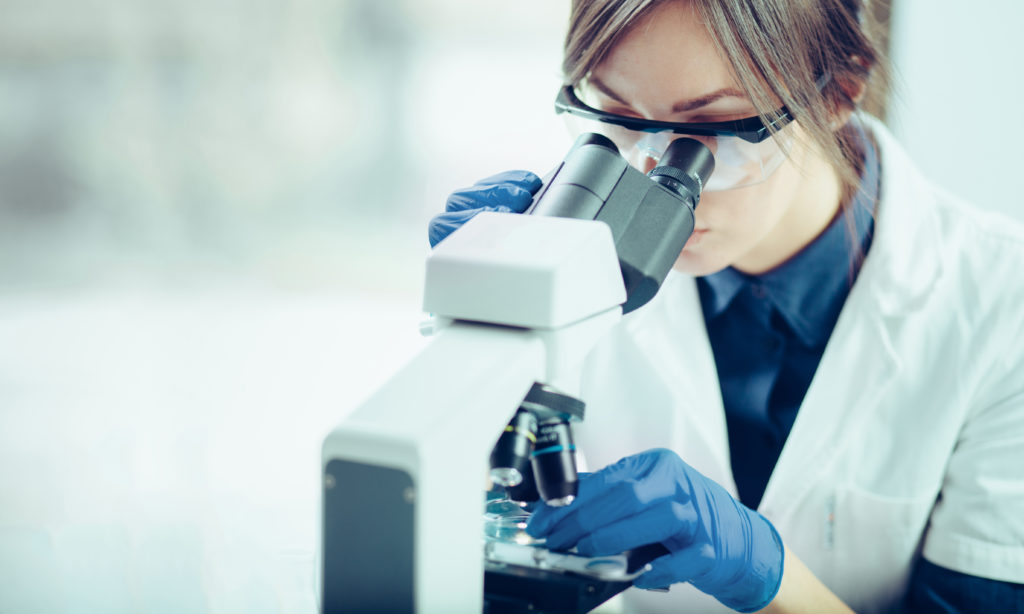What is Laboratory Practice?
Laboratory Practice or Laboratory Science is the practice of completing a variety of scientific experiments and tests in a laboratory setting. Students interested in careers in laboratory practice will study anything from biology and chemistry to medicine and food science.
What 3rd Level Courses are Available?
- Universities and colleges in Ireland are offering courses in the following subject areas:
- Food Science – the study of the physical and chemical properties of food.
- Chemistry – the study of the chemical make-up and interactions between substances.
- Biology – the study of life and living things.
Studying Laboratory Practice in College
Most first year study involves an overview of the subject. This will offer students an introduction to the foundational principles of laboratory practice including biology, chemistry, and procedural practices.
In subsequent years of study, students will combine practical work, written exams, and laboratory work as benchmark assessments of their course progression.
Most undergraduate laboratory practices courses run for three or four years and in certain cases universities will facilitate work experience.
It is common with all science-based subjects that students are expected to engage in a high number of contact hours with lecturers and tutors, ensuring their successful completion of a rigorous curriculum and preparing them for careers in laboratory practices after university.
A bachelor’s degree is adequate for some non-research jobs. For example, graduates with a bachelor’s degree may start working as researchers, product developers, and lab technicians.
Career Options
Graduating from college with a degree in Laboratory Practice will serve you well as it equips you with a unique and marketable skill set. A science degree teaches students to think critically and creatively as well as equipping them with invaluable problem solving and communication skills.
Many recent graduates have gone into ‘entry-level’ careers in Laboratory Practice working as technicians, microbiologists, and forensic scientists.
Other careers in Laboratory Pracitice that require a higher degree of responsibility will typically require further education, training and/or experience to qualify for, eg teaching, research and consulting positions.
Related jobs include:
- Researcher
- Product Development Scientist
- Forensic Medicine Scientist
- Forensic Scientist
- Consumer Products Testing Lab Tech
- Lab Technician
- Microbiologist
- Medical Technician
- Histotechnician
- Immunologist
Further study
An undergraduate laboratory practice degree is often the first step to go onto further postgraduate study often involving specialization in particular fields and areas of laboratory practice and/or undertaking work in new, sometimes interdisciplinary fields.
Visit postgrad.ie for more information.
FAQ
- What points do I need to study Laboratory Practice?
- Different courses and different colleges will have different entry requirements. It’s always best that you check with the individual higher education institution which is available on their websites. As a general rule Leaving Cert students should have a minimum of six subjects which should include: Two H5 (Higher Level) grades and Four O6 (Ordinary Level) grades or four H7 (Higher Level) grades. Subjects must include Mathematics, Irish or another language, and English.
- Many universities also require a Leaving Cert grade O2/H6 in Mathematics, O2/H6 in Laboratory Science, and O6/H7 in English, Irish and two other recognized subjects.
- Are there any particular qualities you need to study Laboratory Practice?
- Students interested in careers in laboratory practice will need to enjoy math and science as well as their application in the real world. They will need to be innovative, creative, and collaborative as well as being able to communicate their own ideas and opinions.
- Where can I study Laboratory Practice?
- Explore your options here
Did You Know?
- Certain blood types may benefit from different dietary and exercise habits!
- Bitter almonds contain trace amounts of cyanide! If an adult were to consume just 50 bitter almonds that had not been heat-treated to remove these toxins, it could be fatal!
- The ‘Father of Chinese Medicine’ Shen Nung tasted and catalogued nearly 400 herbs to determine their toxicology in 2695 BCE!












Comments